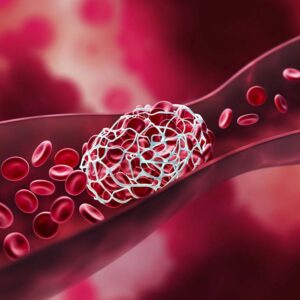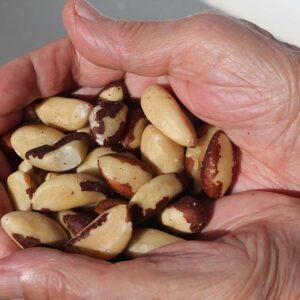
The One Supplement You Need to Take After a Heart Attack
- Discover how this powerful fatty acid is changing the heart attack recovery game
- “There’s no way” you can get what your heart needs through diet. Find out more…
- Two things you need to look for when selecting this healing supplement.
Dear Living Well Daily Reader,
“I can’t wait to take this stupid vest off… but I’m also pretty scared to. What if my heart never heals? What if I have to wear this uncomfortable and restricting vest for the rest of my life?”
This year, my uncle suffered a very serious heart attack. After the initial shock of the event, he had to face the terrifying reality that he would only regain 30 percent of his heart function, even after triple bypass heart surgery.
In fact, his heart was in such bad shape he had to wear a vest equipped with a defibrillator three months after his surgery. This special vest would detect any abnormal heart rhythms and then shock his heart back into normal function. During this time, he experienced several warnings and a few shocks — meaning his heart was struggling to heal.
After he was released from the vest, his cardiologist gave him the same ol’ heart advice they give everyone else — watch your fat intake, cholesterol is the devil, don’t smoke, etc.
But what they didn’t tell him is that there’s a type of fat that could help heal his heart and may even improve his heart functions — one that may have reassured him he could recover from this horrifying health experience.
![]() Fish Oil Heals
Fish Oil Heals
Brand-new research published in the journal Circulation shows that taking omega-3 fatty acid supplements after a heart attack may help the heart heal itself and restore some heart function.
Omega-3 fatty acids are present in some food sources like eggs, fish, grass-fed beef and flaxseeds. However, since it’s difficult to eat enough food to get a high dose, scientists running this study chose to use omega-3-rich fish oil supplements.
Three hundred and sixty people who suffered a recent heart attack participated in the study. They were randomly divided into two groups. Those in the omega-3 group took four one-gram capsules of fish oil daily. The placebo group was given corn oil (hope it wasn’t GMO).
All participants had cardiac magnetic resonance imaging (MRI) both before starting the fish oil or placebos and after six months of treatment. In addition, both groups received lifestyle counseling and were medically monitored during this period, and blood tests were taken to confirm patients in the omega-3 group were treatment compliant.
At the end of the six months, the fish oil group had less thickening and scarring of the heart muscle in the location of the heart attack compared with the placebo group. And the research showed that their hearts were pumping more efficiently.
Reducing scar tissue and improving the heart’s ability to pump blood is vital to the recovery of patients who recently suffered a heart attack, according to Dr. Raymond Y. Kwong, director of cardiac magnetic resonance imaging at Brigham and Women’s Hospital and the lead researcher in the study. He explains further:
The initial insult of a heart attack will damage a part of the heart muscle, which dies, so the rest of the heart muscle has to work extra hard. The heart pump function is weaker and scar tissue develops, and over time these two processes can lead to heart failure.
Another benefit omega-3 offers is reducing inflammation. The researchers observed reductions in biomarkers that indicate inflammation during the study as well. When you couple that with omega-3’s ability to reduce scarring and increase heart function, it’s no wonder that omega-3 is a go-to for anyone wanting to help protect their heart.
Plus, Dr. Kwon reports, “Our findings show that omega-3 fatty acids are a safe and effective treatment in improving cardiac remodeling, so it may be promising in reducing the incidence of heart failure or death, which are still major health care burdens to patients who suffer a heart attack.”
As the results show, it seems logical that getting a daily dose of omega-3 would help ensure your heart health, whether you’ve experienced a heart attack or not.
![]() You Can’t Just Eat Your Omega-3
You Can’t Just Eat Your Omega-3
But there’s just one problem. Dr. Kwon says “there’s no way” to eat enough fish or other omega-3-rich foods to get the same amount of omega-3 in this trial. That’s why it’s so important to make sure you’re getting a healthy dose every day.
Currently, most insurance providers don’t cover fish oil supplements. That may change in the future if studies like this keep popping up.
In the meantime, it’s easy to supplement your omega-3 intake with a high-quality fish oil. Here are two things to look for to ensure you’re getting a quality product:
Purity: Many fish oil sources can contain heavy metals and dangerous chemicals including PCBs, dioxins and mercury. Because of this, many manufacturers use a process called molecular distillation to remove toxins from the oil. If this process is done correctly, it should remove the toxins. However, some manufacturers don’t use this proccess. In order to double-check your fish oil is free of toxins always ask the manufacturer for a certificate of analysis (COA).
Freshness: Some fish oils are rancid. One good way to check this is through the COA. Look for the “peroxide value,” which is a measure of rancidity reactions. This level should be less than 5 meq/kg. If a COA isn’t available, reach out to the manufacturer and ask to see the testing.
My uncle’s 63rd birthday is next week. I’ll be sending him a giant bottle of fish oil supplements. While it’s not a defibrillating vest, it might be the thing that helps heal his heart.
Live well,

Natalie Moore
Managing editor, Living Well Daily
Sources
[1] Omega-3 fatty acids from fish oil, may aid healing after heart attack
[2] Omega-3 fatty acids may aid heart attack healing
Written By Natalie Moore
Natalie Moore is a dedicated health researcher with a passion for finding healthy, natural, and science-based solutions. After a decade of direct healthcare experience in western and natural medicine, she was involved in public health research before joining Living Well Daily.
View More Free Articles
Take the SHORTER Path to Dramatically Better Health
Are you tired of fitness gurus preaching the virtues of 5 AM workouts and pushing Olympic-level training regimens? Their narrative can feel exhausting and entirely unattainable. But before you toss in the towel completely, I’ve got news that might just put a spring back into your step. A groundbreaking new study reveals that the key...
Unexpected Perks of Your Coffee Habit Revealed!
We all know that the first cup of coffee in the morning can FEEL like a lifesaver. But what if it might actually BE saving your life? A groundbreaking new study suggests that your daily coffee habit could be protecting you from not just one but multiple chronic diseases. Let’s pour over this fascinating research…...
The TRUTH About Diabetes Drugs and Brain Aging
You’ve probably seen the gushing headlines… Most say something like, “Common diabetes drug protects the brain against aging!” And let’s face it, that sounds fantastic. After all, who doesn’t want to keep their brain young and in tip-top shape? The headlines refer to the results of a new study that suggests the widely prescribed type...
Hidden Smartphone Danger Puts You at Risk
Remember when we thought cell phones were just something for young folks to obsess over? Back when we were convinced they were nothing more than a passing fad? Well, times certainly have changed. Now, most people… including many of us older folks… have jumped on the smartphone bandwagon. Heck, some of us are practically as...
Preserve Your Mobility with “Agile Aging” Exercises
Aging has a way of humbling us. You lose hair where you want to keep it—and often end up growing it where you don’t. With every passing year, your eyesight fades, and your waistline expands. And as your once quick pace begins to slow, you fear developing the dreaded “senior shuffle.” But here’s the thing....
Yes, Lazy Saturday Lie-Ins Can BOOST Your Health
Are you burning the midnight oil during the week and catching up on sleep on weekends? Well, I’ve got some news that might help you feel less guilty about those lazy Saturday mornings. A new study suggests that weekend lie-ins might be doing far more than just helping you feel refreshed. Experts say they could...
Mailbag: 7 Hidden Culprits Behind Your Weight Gain
“Why am I gaining weight, even though I am watching what I am eating?” – Battling the Bulge Dear Battling, Gaining weight when you’re not trying to is frustrating. And it just gets worse as we age… often regardless of our diet. The truth is that various factors can promote weight gain even when you’re...
Popular Artificial Sweetener Linked to Dangerous Heart Risk
Remember when erythritol was the darling of the health food world? Well, this popular sugar substitute might not be as sweet a deal as we were led to believe… A shocking new study reveals a dark side to this widely used artificial sweetener. It turns out erythritol is associated with a dangerous—and even deadly—heart risk....
Cracking the Code on Chronic Inflammation
Inflammation and obesity are the evil tag team at the heart of nearly every major disease we face—from diabetes to obesity. What starts as a normal, healthy process to fend off dangerous invaders can quickly fan into the flames of chronic inflammation… and that includes in your gut. The trouble is almost no one has...
Dreaming of Better Sleep? Your Gut Holds the Key
Do you toss and turn at night? If so, you’re not alone. In fact, if you’re a senior over 65, you join nearly 17 percent of your peers who ALSO struggle with poor sleep quality. But science has uncovered a natural supplement that not only could help you catch more Z’s but can also give...









